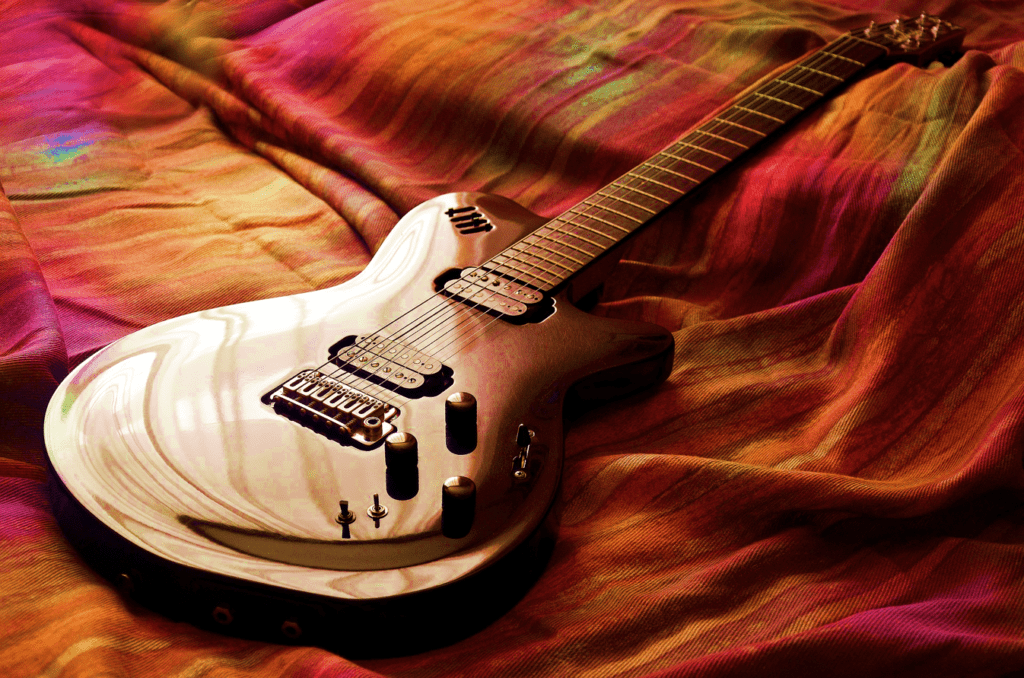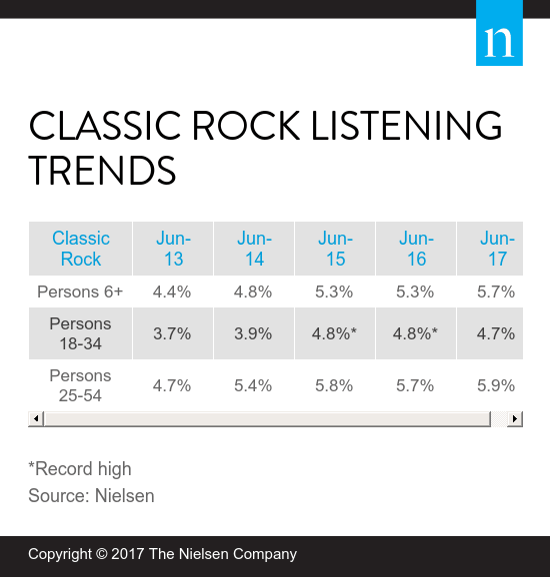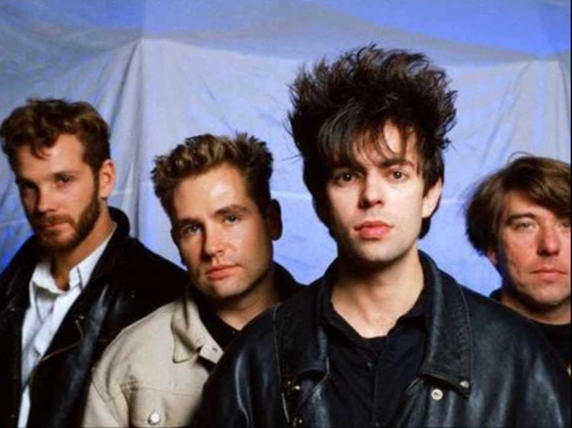
As we firmly move into the second half of 2017, the format ratings stories of the year are becoming clearer. As we’ve seen in the past few years, an odd demographic pattern has been forming around both the Classic Hits and Classic Rock formats in PPM markets:
They are both very competitive among 18-34 year-olds.
In fact, Nielsen declared that Classic Rock is in serious contention to be this year’s “format of the summer.” Not bad for a collection of songs that was first heard on the radio 30, 40, and even 50 years ago.
Whether Classic Rock earns summertime honors or not, it continues to defy format logic by maintain strong shares in all demos – 6+, 25-54, and amazingly, those 18-34s. Here’s the updated chart from Nielsen, tacking the format each June in metered markets:
(BTW if you work for a Classic Rock station, you have Nielsen’s permission to post this chart in every sales cubicle and in the jock lounge.)
 Earlier in the week, musicologist, radio pro, and mega-blogger Alan Cross posed today’s post title as a question in his highly entertaining blog, “A Journal of Musical Things.” Quoting a story in the Vancouver Province by Stuart Derdeyn, the burning issue on the table is whether “Classic Alternative” is poised to be the next incarnation of Classic Rock.
Earlier in the week, musicologist, radio pro, and mega-blogger Alan Cross posed today’s post title as a question in his highly entertaining blog, “A Journal of Musical Things.” Quoting a story in the Vancouver Province by Stuart Derdeyn, the burning issue on the table is whether “Classic Alternative” is poised to be the next incarnation of Classic Rock.
As we learned over the years – and I include myself in that group – there have been many different successful iterations of the original format, from Classic Hits to Classic Rock That Really Rocks.
The “Classic Alternative” concept floats to the service every few years or so. As Derdeyn points out in his story, many Alternative bands from the ’80s (actually, they were more often referred to as “Modern Rock” back then) are still popular concert bands today – especially at the myriad summer festivals scheduled throughout North America.
Artists like the Psychedelic Furs and Violent Femmes are part and parcel of the phenomenon Derdyn says could be on the verge of happening. And in his story set-up, Cross alludes to the fact that most Classic Rock stations have beefed up ’80s music on their playlists.
Derdeyn notes many of these bands didn’t get a “fair shake” when they first hit the music scene back in the ’80s. And certainly here in the States, there were many markets that did not have a true Modern Rock station back then. Most of these songs didn’t cross over to Top 40, while most mainstream rockers (known in those days as AOR) didn’t touch them. They were visible on MTV during that time, but less prominently played on FM radio.
While these bands may do well at state fairs and other summer festivals boasting well-stocked lineups of bands, their ability to support a format is questionable. Classic Rock – and its derivatives – as well as Oldies stations were predicated on the power of nostalgia – not just for a few thousand fans in a market, but for tens of thousands or more of die-hard supporters. We’re talking mass appeal vs. niche. 
If you’ve never heard of the band pictured at right*, 7 spins a week on a Classic Alternative station isn’t going to turn their music into high-testing big hits in 2017. It’s hard to create a groundswell of support for poorly exposed music that’s now 30+ years old.
Personally, I’m a fan of a lot of this stuff, despite the fact it received consistently sporadic airplay in Detroit where I programmed. Oddly enough, one of my favorite satellite music channels is “1st Wave,” which features a steady diet of bands like New Order, Depeche Mode, and others that Derdyn mentions in his column. I would bet the folks at SiriusXM would tell us it’s not among the most popular of their themed music formats.
For a new nostalgia-based format to succeed on a sustained basis, it needs a strong base of existing fans that loved and adored the music in real-time – when it was first released. That’s just not the case here.
Just because music is old doesn’t make it classic.
And by the way, imagine how Sean Ross’ head will explode if the song of the summer of 2017 turns out to be “Bohemian Rhapsody.”
* It’s Echo & The Bunnymen
Thanks to Nielsen and Jon Miller for the data.
- Radio’s Dilemma: Trump Or Get Trumped - March 13, 2025
- What About Bob? - March 12, 2025
- Inside “3 Minutes” – An Exclusive Interview With Nielsen’s Rich Tunkel - March 11, 2025




Not to cause trouble but how about creating brand new formats? Scary, subversive, untested, untried, disruptive formats? But let’s not call them formats.
Trouble? These are the kind of comments I hope we get. Wasn’t HD2 supposed to be the launching pad for dangerous, spontaneous niche radio? And I don’t care what you call them – it sure would be nice if people were buzzing about what they were listening to on the radio. Thanks for the comment, Walter.
Excellent column Fred! I only wish that Modern Rock from the eighties could become the new Classic Rock, as in my opinion that was the best popular music the decade produced. But for all the reasons you enumerate, it will never happen, at least not in the US. In the UK and other parts of Europe most of those bands had a higher profile and many more hits, and the format could probably be sustained there. Among the only places that Modern Rock bands get any exposure in this country these days are in period films and TV shows. For example, “The Americans” is a great show by any measure, but a particular joy for any fans of Modern Rock. Check out Season 1, Episode 4 (about how the KGB reacted to the attempted assassination of President Reagan), which uses the song “Pictures On My Wall” by Echo & the Bunnymen, among others.
Lots of great music from the past lives in wonderful films. For me, it was “Blister In The Sun,” prominently featured in “Grosse Pointe Blank.” Thanks for making a strong point, Kurt.
Thanks Kurt.
Tried a classic alternative format in ’93 – ’94. A little soon, perhaps, but it was met with a strong positive reaction by listeners who had a modern rock station in their market but didn’t listen to them anymore because they did not like grunge. As Nirvana, Pearl Jam, Soundgarden, etc… dominated modern rock station playlists, these listeners had nowhere to go. These “80’s cutting edge” listeners were not so cutting edge anymore with the turn of the decade (not to mention, when MTV wasn’t playing grunge, they were playing rap). I have noticed that classic alternative works pretty well as a cornerstone in a Triple AAA format, but as a standalone format itself, I believe you are correct Mr. Jacobs.
Timing, circumstances, the competition, and the market – all variables in this calculus. Thanks, Kurt.
How come they can’t mix these tunes into the classic rock formats that are getting soooooo stale. Seriously some of the songs are going on 50 years old! Its music of your life or the stardust format that our parents had when they were in their 30’s and 40’s. The Beatles, Who, Doors and Hendrix belong on an oldies format at this point. Why is radio so slow to keep up in an age where everything is going so fast to keep up with shrinking attention spans and competition from new media? I hear our Classic Rocker in Baltimore playing more 90’s, but its all the Seattle stuff or they will stray into U2 for alternative.
CLASSIC is exactly that! The Cream of The Crop. The All Time Favorites. The Greatest Hits of All Time. I agree with Walter: Introduce NEW collections of Outstanding Music with Modern Curation, Presentation and Information. Sure beats the same old, same old…on the corner of Fresh & Familiar. Along with new sponsor presentation, it will fix some big signals with in-house resources. Thank you, Fred! Clark, Boston. http://www.broadcastideas.com
Thanks, Clark.
I wondered when this would happen. LA would be the perfect launching pad for this look back at the 80’s. KROQ was a huge hit in that market playing thr Ramones, Pretenders, Sex Pistols etc. it was also a darn good radio experience with a staff of interesting radio personalities and a great sense of humor.
Yup, an LA thing. Maybe a Left Coast thing, but a market almost had to support a strong Modern Rock station back in the ’80s in order to have a sufficient nostalgic base. And yes, there’s the jock/presentation piece – something that’s too easy to overlook. Thanks, Dan.
While I get your point about the original exposure of the music, that varies by market. In markets with a real Alt/Modern presence in the day these songs could work OK.
But you don’t address another point. These 80’s bands (and OF COURSE I recognized Echo & The Bunneymen, and further know that Echo was the drum machine) had some hits. But they were never “album” bands.
Classic Hits tends to play only singles, while Classic Rock plays album tracks that weren’t on Top 40. That’s not an option for these 80’s bands. With most 80’s bands there are no useful depth tracks, and many of the bands were one-hit wonders.
From a research standpoint, if the song didn’t have a video on MTV, it’s generally useless today.
I think you’re right about the album vs. singles nature of the two formats. And your last line is spot on, Zeb. Video really drove the buss for this genre. Thanks for the comment.
Well, when we did the first “all 80’s” station in Columbus in 1998, I found that the rock product drove the bus. Alternative was a bit weaker and tested so at the time. But, we were a bit early in the curve (as today’s radio now shows), and my 20 something nephew talks a lot about 90’s alternative and grunge. So…my answer is a qualified maybe. It’s not always bad to be ahead of the curve. Sometimes, you’re just not in the right place at the right time.
I think a qualified maybe is a fair assessment, although I’m skeptical about a success for the format in the Midwest. Thanks, Kevin.
Three signs of caution about the classic alt phenom being the next big thing:
1/ Distribution of population. The birth rate cratered in the mid-70s, with a slow climb into the early 80s. There are fewer GenX’ers.
2/ Diffusion of musical influences. For every 90’s alt buddy, I have a hip-hop buddy. Angst a la carte.
3/ How much love did that genre of music enjoy in our town? If you had a big alt scene in the 80s/90s, perhaps there’s enough fuel to catch fire again.
Three good tests, Smokey. It is clearly a market by market thing. Thanks for chiming in.
As you know, Fred, I focus on Classic Hits, but I stay closely in touch with what happens in Classic Rock because there is some synergy there.
My approach (which again, as you know) is all-80s, and I have always put the Modern Rock in a category by itself to give those songs prominence against all the other genres. Oddly, the off-balance creates better balance, because many of the Modern Rock titles are fondly remembered from MTV and club play when they were currents.
That said, I’d love to try an all-Classic Modern Rock format in L.A. (where I’m based); I thought that was a good idea ten years ago but the market ownership is so concentrated — and so much of the programming here is in Spanish — that I’ve pretty much given up on anyone freeing up a signal to give it a spin. Heaven knows I already have the research for it sitting in a file cabinet here.
LA would be one of those fascinating markets. My recollection is that it was attempted in San Diego at one point, but probably too early to be effective. Again, KM, it’s a selective thing, but very likely not a national success.
Fred, my thought is that such a format would have the best success in a market that had a KROQ (L.A.) or 91X (S.D.) in the 80s. And it would need to be tweaked to encompass artists and songs that were big on the original station and downplay those that were bigger elsewhere.
An example is right there in your post, in fact. Echo & the Bunnymen were big on KROQ but were hardly heard on 91X.
So you’re right that there likely could not be a “national” Classic Alternative format. That’s probably why SiriusXM would tell you “1stWave” isn’t overly popular … the very nature of what constitutes a “hit” varies so much.
I love the topic Fred! Lately, I’ve been enjoying the stream of 103.1 The Wave out of Salt Lake City, UT (https://www.1031thewave.com). In my opinion, the station has a very good Classic Alternative music mix, with a balance of big Modern Rock hits and a sprinkling of REALLY lost tracks, and it’s hosted with air talent. I would love to see more stations attempt the idea, but as you and others stated above, there are probably very few major markets where it might work.
As a specialty show, Classic Alternative has been a good Sunday morning compliment for quite a few existing Alternative stations. In some markets, I wonder if a Classic Alternative WEEKEND show might also work in a Classic Rock, Classic Hits or even an AC format (if you stick to the bigger MTV hits)?
Scott, thanks for the note. Specialty shows are a great way to pepper in material. And of course, any station that conducts music research can test these titles to ascertain their familiarity and popularity with their audiences. Appreciate the comment and thoughts.
sadly, i agree with fred’s assessment. i hope…..we are both wrong tho.
indeed, much of this music stands the test of time….IF….you were exposed to it 30 yrs ago.
Mel, it’s all about what you were listening to back in high school or in your dorm room. If the music became part of the soundtrack of your life, you never let it go. For much of that Classic Alternative, exposure was spotty, situational, and market by market. Good to hear from you.
Hey Fred, I’m reading this in early 2019 as I just found this thread. My station flipped from 20+ years of A/C to Classic Hits in 2016 and has #1 ratings. There’s a station in the market that has been Triple A and Alternative but doing poorly. If I had a chance to program it, I’d love to steer it to Classic Alt Hits. A co-worker argued against that, but I had success in the ’80s programming Modern Rock at a couple of stations. Actually, I “flavored” my AOR format to distinguish my stations from the straight-ahead rock competition. They were songs/artists that were huge in my Northern California area then. In my super-competitive Bay Area market today, wouldn’t you think that an Alternative-leaning Classic Hits format could fly?
I don’t know specifically, Jona. But I do know that in an overcrowded radio market like yours – where you’re competing against streamming, podcasting, etc. – you’d better “own something.” And the good news, most of these questions are very researchable. Thanks for the comment.
Hi, Fred. Hope I’m not commenting too late!
Well, there were already talks of “Classic Alternative” as early as 2004, as this Rolling Stone article showshttps://www.rollingstone.com/music/music-news/nirvana-bump-bizkit-off-dial-185190/
Sifting through it, the “60/40” ratio of new/old music is pretty much what the “Current Alternative” format has become these days.
Anyway, I think this article highlights what a would-be successful “Classic Alternative” station would sound more like. If anything, the time is now, as Alternative’s time as an arbiter of pop culture was pretty much a very specific moment in time, and those that were of age during that time frame are now firmly in that demo that advertisers tend to chase the most.
I mean, Classic Hip-Hop is now a thing, precisely because of the demo. The only difference is that there will still be legs for that format for years to come. Classic Alternative, on the other hand, will probably come with an expiration date.
My two cents.
Ricardo, appreciate the observations. A lot of the success of “Classic Alternative” is hinged on how much that music was played in each market.